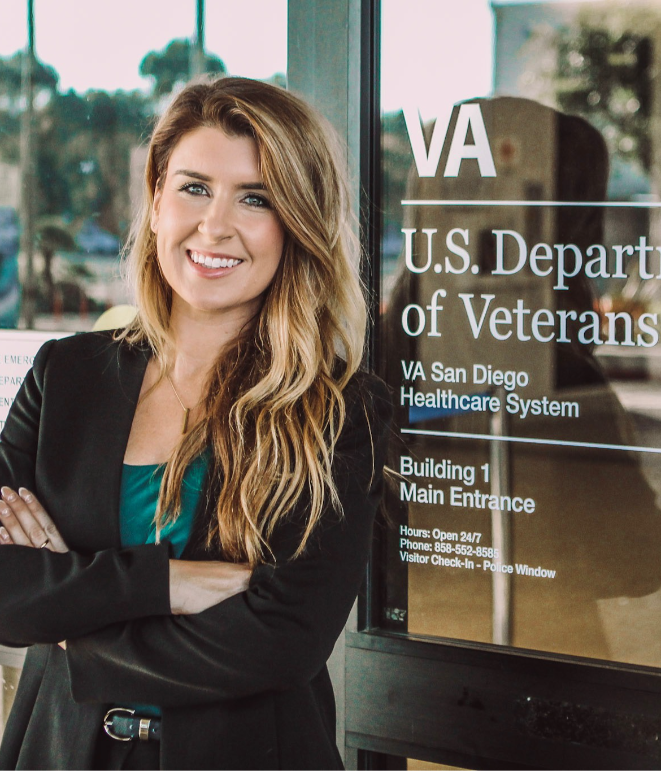
How to Talk with Your Hands
New research led by USC Marshall’s Luca Cascio Rizzo reveals that gestures that visually represent what speakers say help audiences perceive them as more competent and persuasive.
MBV Program Helps Combat Medic Give Back to Veterans
MBV Program Helps Combat Medic Give Back to Veterans
Army veteran and MBV alum Vanessa Bolognese MBV ’19 is answering the call to duty, this time in the healthcare industry.

Vanessa Bolognese’s MBV degree is helping her make a difference for veterans.
[Photo courtesy of Bolognese]
Sergeant Vanessa Bolognese MBV ’19 has always sought to improve veterans’ well-being. Whether as an Army combat medic on two tours of duty in Iraq or as a registered nurse in the U.S. Department of Veteran Affairs (VA) after her honorable discharge in 2009, Bolognese has been determined to provide service members with the care they need.
Building on her vast military background, Bolognese joined USC Marshall’s Master of Business for Veterans program (MBV) in 2018, gaining valuable insights to serve her community from a leadership position.
Upon graduation from the MBV program, Bolognese quickly rose from registered nurse to nurse supervisor — nearly three jumps up the promotional ladder. In under two years, she advanced yet again to quality consultant at the VA, where she currently leads teams, evaluates systems, and works every day to improve the health and well-being of veterans like her.
Bolognese believes her rapid ascension to leadership positions is in part due to the confidence and experience gained in the MBV program, specifically to the skills she gained in courses on leadership, negotiation principles, and business analytics.
“One of the things that I learned at USC is to go for it, to level up,” Bolognese said. “Don’t ever take yourself out of the game. Always go for what you want and have confidence and use your network.”
Bolognese felt the support of the Trojan Network from her first day of orientation. At an early get-together with her cohort, each student was given the chance to stand up, introduce themselves, and describe their military experience. Between high-ranking officers and decorated war heroes, Bolognese admitted that she initially felt daunted.
She shared that James Bogle, MBV program director, and Robert Turrill PhD, former academic director of the program, encouraged all students to reach across rank and form new bonds with each other. Soon, thanks to the culture of inclusion and support within the MBV program, Bolognese and her classmates developed a sense of fellowship reminiscent of their time in the military.
“I thought it was so amazing how USC thought it important to incorporate this program as a part of the Trojan network,” Bolognese said. “It bridges the camaraderie of the military with the camaraderie of the Trojan network. There are very few schools that have such a strong, tight knit network.”
Through classes, activities, and weekly happy hours, the group formed ties that persist to this day.
“It really felt like we were a true family,” Bolognese said. “It’s now five years later, and we’re still really tight.”
Due to their own military experiences, MBV leaders like Bogle and Turrill can empathize with their students’ unique perspectives, as well as the challenges and opportunities of transitioning to civilian life.
“The leaders are almost all veterans themselves, and so they have that identity [and] that relationship with you immediately,” Bolognese reflected. “We talk about it, and they really do want people to be proud of their service.”
It bridges the camaraderie of the military with the camaraderie of the Trojan Network.
— Vanessa Bolognese
MBV ’19
In many courses, according to Bolognese, veterans taught veterans. Bolognese was eager to share her perspective and lead her cohort, in and out of the classroom by combining the mission-driven nature of the military with the community and excellence-based principles of the Trojan Network.
Bolognese’s experience with MBV personally benefited her in numerous ways. The program bolstered her confidence; encouraged her to use her voice; and offered her the skills to advance in her career.
“I’ll state the obvious: having USC on your resume is a big boost,” Bolognese said. “The network does run deep. You can be international, across the country, and people will recognize that.”
Most of all, though, Bolognese left empowered to give back to veterans by monitoring top facility performance and ensuring efficient and effective patient care.
“Giving back is a core human activity, and our communities depend on it,” Bolognese said. “In my life, serving my country and then giving back to my brethren is what spoke to me the most. I am truly grateful to be in a position to continue to serve our country in this way, not in the line of fire but instead helping veterans receive quality care.”
Bolognese believes that the bonds formed in the line of duty don’t end at discharge; they transcend rank and oath, persisting throughout veterans’ lives. In her specialty, healthcare, Bolognese sees a way to give back to a community that has given her so much.
RELATED
How to Talk with Your Hands
New research led by USC Marshall’s Luca Cascio Rizzo reveals that gestures that visually represent what speakers say help audiences perceive them as more competent and persuasive.
Forbes 30 Under 30 Entrepreneur Shares His Journey from Business School to Startup Success
Bobby Pinckney ’20 is creating impact with innovative technological ventures and inspiring new Trojans to shape the future.
Study Finds Power Shifts at Work Can Boost Employee Energy and Productivity
New research shows natural ups and downs of workplace influence can sharpen focus, fuel motivation, and support goal pursuit.
USC Marshall School of Business Launches Asia Executive Advisory Board to Strengthen Global Partnerships
Distinguished leaders gather from across Asia to guide strategic expansion and deepen regional engagement.
Dean’s Dialogue: SpaceX CFO Bret Johnsen on Space Innovation and the Trojan Network
Bret Johnsen, a Leventhal alumnus, spoke with Marshall Dean Geoffrey Garrett about SpaceX’s cutting-edge projects, U.S. manufacturing, and the value of a USC education.